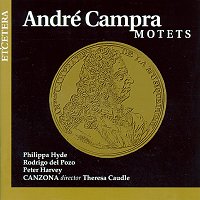|

3. Stylized subtleties - Campra emerges'The performers ... present the music with an affectionate spontaneity ...
'Canzona' is directed by Theresa Caudle
with an elegance appropriate to the music ...'

Lully was the Grand Panjandrum of music at the court of Louis XIV, famed
as a composer of Heroick operas and of Grands Motets paying homage
to a King almost identified with God. André Campra was a relatively
small fish in these capaciously glittering waters: a man born in 1660 and
nurtured provincially in ecclesiastical circles in Aix-en-Provence, and
later music-master at Toulouse Cathedral. Well-connected, however, he intermittently
visited the court to make delightful, if minor, opéra-ballets,
such as L'Europe Galante in 1697 and Le Carnival de Venise
in 1699. His music, like his temperament, was always equably poised
between church and court, though he was less happy in Lullian grands
motets than with chamber music intimately scored for solo voices with
a continuo of gamba and organ or theorbo or harpsichord, with an occasional
obbligato flute or violin. The texts Campra favoured were from the Latin
Vulgate of the Psalms or the quasi-erotic Song of Songs; he published
five volumes of these chamber motets between 1695 and 1720. They were conspicuously
successful, and the pieces on this CD are extracted from the first two books.
The performers, Philippa Hyde (soprano), Rodrigo del Pozo (counter-tenor),
and Peter Harvey (bass), present the music with an affectionate spontaneity
that renders their artifices of ornamentation and 'notes inégales'
briskly vivacious, or delicately expressive, or exquisitely sensual, as
occasion offers. The ensemble called Canzona is directed by Theresa
Caudle with an elegance appropriate to the music; it's touching that
artists reared in our brashly materialistic world can relate thus directly
to music so remote from us in its stylized subtleties: though of course
their hedonism was, like Lully's, dependent on social privilege as
well as, like ours, on an almost indecent affluence. Especially entrancing,
surviving over what seems to be, but isn't, aeons of time, is the deliciously
flowery motet Florete prata [listen -- track
2, 7:40-8:40], as sung by counter-tenor Rodrigo Pozo, who was
taught, I wasn't surprised to learn, by Nigel Rogers; the duet O
Jesu Amantissime (not to a psalm but to a specially-written dog-Latin
text that was also ravishingly set by Couperin); and another duet, Dissipa,
Domine, radiantly lachrymose in caressing suspensions.
Copyright © 14 October 2000
Wilfrid Mellers, York, UK
 CD INFORMATION - ETCETERA KTC 1201
PURCHASE THIS DISC FROM CROTCHET
<< Music
& Vision home
Dale Warland Singers >>
CD INFORMATION - ETCETERA KTC 1201
PURCHASE THIS DISC FROM CROTCHET
<< Music
& Vision home
Dale Warland Singers >>
 |
To listen to the aural illustrations in this review,
you may need to download RealNetworks' realplayer 8. |
|

